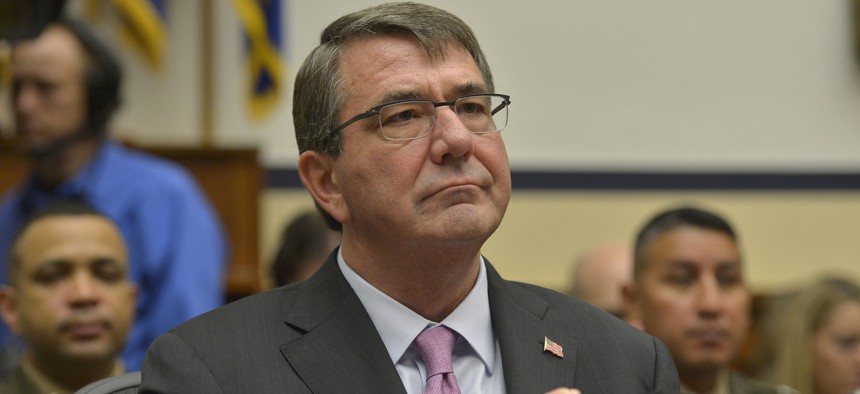
"If we have the budget one year at a time—and I am not blaming anybody for it and I realize it's a collective thing where the country needs to rise up and get it together in this area," Ash Carter said Wednesday. Glenn Fawcett / Defense Department
Top Defense Officials Told Congress Parts of the Pentagon's ISIS Strategy
Secretary of Defense Ashton Carter and Joint Chiefs chair Martin Dempsey testified before the House Armed Services Committee on Wednesday.
A week after President Obama said his administration had yet to develop a "complete strategy" to fight the Islamic State, his top defense and military officials tried to tell Congress that it has.
At a House Armed Services hearing Wednesday, Secretary of Defense Ashton Carter and Chairman of the Joint Chiefs Martin Dempsey described a nine-part plan that spans the State Department's diplomatic efforts—the "first and most critical line of effort"—to the military's air strikes. Carter and Dempsey picked up where Obama left off at his G-7 press conference, when he emphasized the importance of the involvement of Iraqi forces in the fight against the terrorist group.
The U.S. military campaign "requires capable, motivated, legitimate local ground forces to seize, clear, and hold terrain," Carter said. "That's the only way to ensure a truly lasting, enduring defeat of this movement."
Most lawmakers at the hearing expressed dissatisfaction with U.S. actions regarding the Islamic State: Some Democrats were disappointed with U.S. political strategy in the region, while some Republicans—despite testimony to the contrary—rejected the idea that the U.S. has a plan at all.
"I think we've concluded we don't have the strategy," said GOP Rep. John Kline of Minnesota. "And the fact the commander-in-chief said we don't have a strategy. So I am mystified about what we are doing here since we don't have a strategy."
The dissonance between the president's remarks and Wednesday's testimony suggests the U.S. is straddling the terrain between strategy and no strategy. Carter called the ground campaign a "work in progress." Pentagon and White House officials have developed the "right strategic framework," he said, but its "execution can and should be strengthened, especially on the ground." Carter said improvements can be made in how quickly Iraqi forces are equipped, how assistance to Iraqis is "tailored," and how the U.S. reaches out to Sunni communities to join the fight.
Two days after Obama's remarks, the White House announced that at the recommendation of Carter and Dempsey—and at the request of the Iraqi prime minister—it would deploy "up to" 450 non-combat troops to Iraq to "train, assist, and advise" local security forces, bringing the U.S. troop count in Iraq to 3,550. Carter said Wednesday that the troops will be headquartered in the "heart of Sunni territory."
Republican Armed Services chairman Mac Thornberry questioned whether the 450 soldiers would help tip the balance toward success. Carter said that the number of forces doesn't matter as much as the location.
"I think it will make a big difference in the performance of the train-and-equip program [regarding] recruiting Sunni fighters," Carter said. "We're actually seeing that in the days since we established that presence there." He told Thornberry that military officials would be able to tell within weeks whether the 450-troop addition is working.
Virginia Republican Rep. Randy Forbes tried to push Carter into saying whether he would support Obama's veto threat on the defense authorization bill that passed the House last month. The defense secretary responded by criticizing defense budget uncertainty. The U.S. needs a multiyear budget, he said.
"If we have the budget one year at a time—and I am not blaming anybody for it and I realize it's a collective thing where the country needs to rise up and get it together in this area," Carter said, but "it's very damaging to the institution that I feel responsible for and am responsible for."
U.S. officials are trying to build military and diplomatic partnerships abroad to fight the Islamic State, and Carter said an inability to agree on a military budget "looks terrible" on the global stage.
"It gives the appearance that we are diminishing ourselves because we can't come together behind a budget year in and year out," he said. "I continue to hope and believe that we can come together [on a budget] that has a multiyear horizon and allows us to plan and execute programs and recruit and retain people in the way that I think we need to do."







